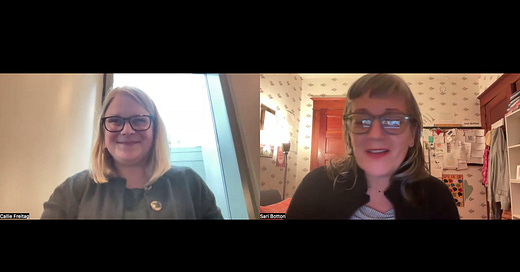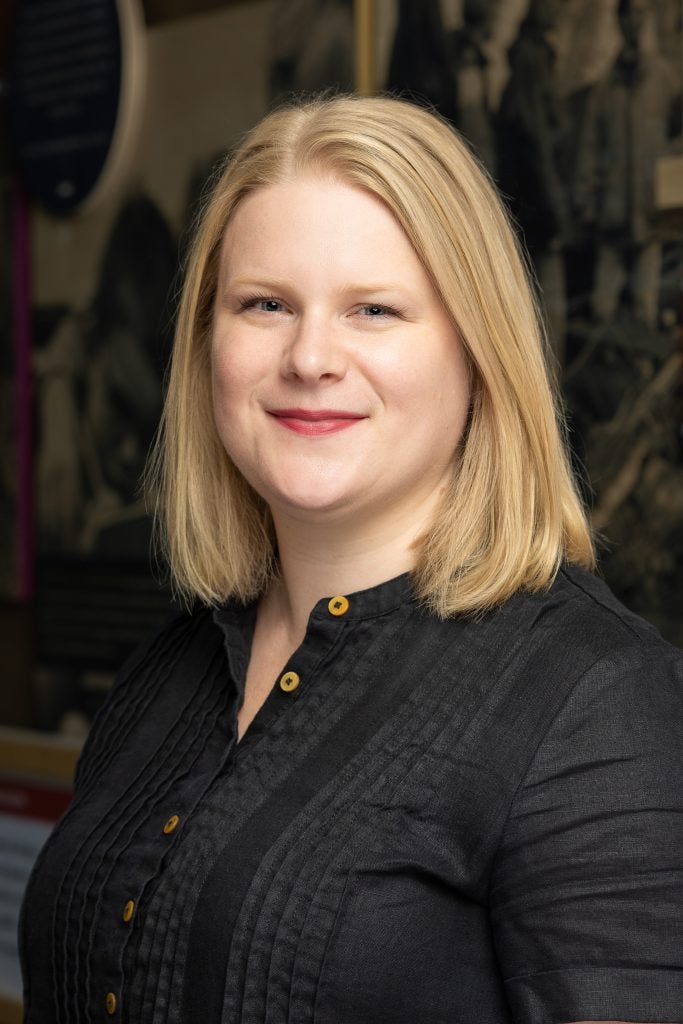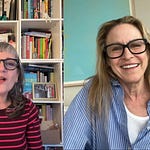Readers,
Since Election Day I’ve had many fraught conversations with peers and elders, all of us wondering how new policies soon to be ushered in with the second Trump administration might affect those of us in midlife and beyond.
Together we fretted about whether we can count on Social Security and Medicare at retirement age, whether we might be able afford long-term care, and/or the help of caregivers—for ourselves, or for the elders in our lives—and more. None of us had answers, just dribs and drabs of information we’d seen in various conflicting reports in the media.
Lacking any real understanding about what might happen and what we can do about it only added to my anxiety. So I decided to seek more informed answers from a policy expert. I put out a query on BlueSky, and it led me to wonderful Callie Freitag, Assistant Professor at the University of Wisconsin-Madison Sandra Rosenbaum School of Social Work. (Callie, it turns out, is also a long-standing Oldster subscriber.)
Callie and I spoke last week. Here, you can either watch the video of our conversation, or read the lightly edited transcription of it below. I found what she had to say enlightening, and empowering. At the end of the conversation, after I was done recording, she emailed me to add this:
“I want to clarify that the policies that I'm talking about are policies generally focused on the group we call ‘older adults’: people aged 65 and over who qualify for Medicare and Social Security and who may need long-term care. That said, I take the view like you do at Oldster, that aging is a lifelong process and people can be Oldsters at any age. Policies that harm children and young adults will shape their life trajectories and may determine if they get to grow old at all. All policy is aging policy.”
And now, with no further ado, the interview, below and above… - Sari
Callie Freitag is an Assistant Professor at the University of Wisconsin-Madison Sandra Rosenbaum School of Social Work. Her work focuses on safety net policies related to aging, disability, and poverty. Prior to academia, Callie was a policy analyst & advocate focusing on aging and long-term care policy in California. At age 34, Callie identifies as a lifelong Oldster. Follow here on BlueSky.
Oldster Interview with policy expert Callie Freitag
Sari Botton:
Welcome to the Oldster videocast. Today my guest is Callie Freitag, Assistant Professor of Social Work at the University of Wisconsin-Madison. She's a policy expert focused on aging, disability, and poverty. And today we're going to talk about what the second Trump administration will bring for elders and how to prepare for it. Welcome, Callie.
Callie Freitag:
Sari, I am so excited. I was telling you earlier, I'm a big Oldster fan. I consider myself, at age 34, an Oldster. So I'm thrilled to be here.
Sari Botton:
Well, I'm so glad you are. I know that a lot of Oldsters of every age are a bit worried about what the second Trump administration will bode for those of us getting older. I know my husband and I have been talking a lot about, Are we going to have Social Security? He's just a few years away from being able to collect. Are we going to have Medicare? What else is it going to mean for us? So maybe you can tell us some of what you've been looking into.
We're in a care crisis in this country. And immigrants, both documented and undocumented, do a lot of the nation's care work. Mass deportation runs the risk of decimating a care workforce that already is very sparse. We don't have enough people to perform care for people who have daily needs.
Callie Freitag:
Yeah, I'm thinking about things in three areas that I'm going to talk about. I'm going to talk about immigration, healthcare, and economic security. I'm going to take these one at a time.
Sari Botton:
Yes, please.
Callie Freitag:
First, with immigration, immigrants make up a huge part of our care workforce. For people who have long-term care or personal care needs, mass deportation could deplete an already really sparse care workforce. We're in a care crisis in this country. And immigrants, both documented and undocumented, do a lot of the nation's care work. Mass deportation runs the risk of decimating a care workforce that already is very sparse. We don't have enough people to perform care for people who have daily needs. You know what I mean?
Sari Botton:
Yeah. And I know that that work is unfortunately terribly underpaid, which is criminal. And also this is a heartbreaking possibility. I'm sure that people have relationships with their caretakers and also they're going to need other caretakers who are willing to work for very little money. So what can people do about this?
Callie Freitag:
I think my advice on immigration and about really every policy issue that we'll talk about is get informed and get involved. There’s great organizations like the National Immigration Law Center, (NILC) and other organizations that will help you stay informed about what's happening. I get a million emails all the time and I like to know what's going on. So then I can plug into local organizations, attend a protest.
Like, family separation under the first Trump administration only lasted for about a year because people were organizing and Trump did not like how it played on TV. I think the time for a protest and mobilization is now and I love the phrase: “Stay ready so you don't have to get ready.” I think staying involved with those organizations, especially locally, is a good way to go.
Sari Botton:
Oh, okay. That's good. That's really good. And so onto the next…
Callie Freitag:
Immigration leads me to this bigger issue of long-term care and healthcare. I'm talking about this care crisis. Something I'm so disappointed about, it's not just what the new administration will do, but it's the opportunities, the things that we don't get to do. The Harris campaign had a great proposal to bring home care and long-term care into Medicare because right now the only public payer of long-term care is Medicaid, which requires you to be very low income and have very low assets. So right now, most people have to pay out of pocket for care help. And that is really expensive.
And then people end up spending down their assets, spending down everything they have until they qualify for Medicaid, which is the low income healthcare program. The Harris campaign said, "Let's make home care eligible under Medicare." And only people aged 65 and older, and some people with disabilities who have disability insurance, can get Medicare. So it's not everyone. Taking this view of being an Oldster as being a lifelong endeavor, some of what else is going on is that you have to be 65 or older to have Medicare, and we could have enacted some cool policies about being younger and getting care or getting healthcare. There are all these things on the table, like Medicare For All, that just aren't going to see the light of day in the Trump administration.
Sari Botton:
Yeah, heartbreaking. I really thought that campaign promise from Harris of bringing home healthcare under Medicare was brilliant.
Family separation under the first Trump administration only lasted for about a year because people were organizing and Trump did not like how it played on TV. I think the time for a protest and mobilization is now and I love the phrase: “Stay ready so you don't have to get ready.” I think staying involved with those organizations, especially locally, is a good way to go.
Callie Freitag:
Yeah, it was. And for organizations in this area, I love the organization Caring Across Generations. They do some really cool work. It's not just about caring for older folks, but also caring for younger folks and the people doing the work who are kind of right in the middle. I love them and the work that they do.
Related to long-term care is also just healthcare in general. Focused on Medicare, in Project 2025, they proposed to make Medicare Advantage, which is a managed care plan, the default option for people under Medicare. Right now in Medicare, you have an option. You can do Medicare Advantage or you can do fee-for-service. A managed care plan like Medicare Advantage, it's really good for the health plan, especially if you're healthy. Because what happens, and this is very technical, but the government pays your insurer or your healthcare provider a capitated rate, like one lump sum payment per person per month.
And it's great if you're healthy. And it's great for the health plans if you're healthy, because then you don't need very many services. And the health plan's going to keep a bunch of that money, your provider keeps a bunch of that money. But if you need a lot of services and you're expensive to the health plan, then the health plan's not happy and they start denying services or these other things. And there've been studies about this that that some of the health plans, these Medicare Advantage plans, are not providing equal services for fee-for-service, they're denying coverage to people. And it actually doesn't achieve the policy goal, which was to save money. So that's something that I'm keeping an eye out for. It's hard to know exactly what's going to happen, but I'm watching that as well.
Sari Botton:
Oh wow. That's in Project 2025?
Callie Freitag:
Yeah.
Sari Botton:
Wow. I didn't even realize that it went that far.
Callie Freitag:
Oh yeah. It's very detailed. It's very specific. And it's cloaked under language like government efficiency and making healthcare more efficient. But usually, especially in healthcare, being efficient means denying people services.
Related to long-term care is also just healthcare in general. Focused on Medicare, in Project 2025, they proposed to make Medicare Advantage, which is a managed care plan, the default option for people under Medicare.
Sari Botton:
And I'm imagining that all of this is going to have ramifications for the sandwich generation, people who are caring for both their children and their grown older parents, elders, especially if it's not affordable to have home healthcare.
Callie Freitag:
Oh yeah. That's huge. My mom is part of the sandwich generation. My grandma, her mom, lived with us, and then she had three kids. I was the oldest of three. And she worked full-time in a job. But luckily that job gave her flexibility. But my dad also had a flexible job and was really involved, but she was so busy and burnt out. And now that her mom has passed and us kids are adults now, she gets to enjoy her life a little bit more. But it was really strenuous and stressful, and we were in a good economic position. Think about people like single moms, for example, or people who are caring for people with such demanding care needs and don't have flexible jobs where calling out sick from work means you get fired next week or they don't give you enough hours.
Sari Botton:
Yeah, that’s rough.
Callie Freitag:
I've been working on projects about paid family and medical leave. The state of Washington, which is where I got my PhD (at University of Washington, not Washington State University—a very important distinction, go Huskies) enacted paid family and medical leave. And it's not just for people having babies, it's also for people providing care or needing care themselves and allows them to stay at work longer if they're carers or have needs themselves. And that's another missed opportunity in this new administration: we can't enact something federal like that, not with a Republican controlled House and Senate with Trump as president.
And so this is another place where the action is really at the state level, and it's very exciting to see that happen. So I'd also recommend to Oldsters out there that if your state doesn't have paid family leave, see who's advocating for it. An organization called 9to5, like the Dolly Parton song 9to5, they're doing a really good job advocating for paid family leave. And I think that is just such a huge important thing for the sandwich generation.
Sari Botton:
Okay. What was the next talking point?
Callie Freitag:
Economic security.
Sari Botton:
Yes.
I'd recommend to Oldsters out there that if your state doesn't have paid family leave, see who's advocating for it. An organization called 9to5, like the Dolly Parton song 9to5, they're doing a really good job advocating for paid family leave. And I think that is just such a huge important thing for the sandwich generation.
Callie Freitag:
I have a few thoughts under this. First, let's talk about Social Security—you asked about this. It’s hard to parse what exactly they'll do. In Project 2025, which lists every federal agency by name and has a plan, Social Security is missing. And I think that's because Republicans know that Social Security is really important to some of their base. And in an interview with AARP, Trump said that he's not going to raise the retirement age and that he's not touching Social Security. So I think it's unlikely that we'll see benefits cut in the next four years. However, the Social Security Trust Fund, the financing for Social Security, is set to become insolvent by 2035. So we have ten years. And when that happens, benefits won't totally go away, Social Security won't go away, but benefits will be paid at like 85%, 86%, something like that.
Sari Botton:
Wow.
Callie Freitag:
It’s a big cut, like a 15-ish % cut to people's benefits. And for people who rely just on Social Security, they're already more likely to be living in poverty in general. It's huge. What we're going to see probably is no action on Social Security, which is a bad thing. Raising the taxable income limit for above 175,000, which is where it's at right now, that would be a way to shore up financing or making changes. But it's unlikely to happen. And if Trump does something that he said he is going to do, which is eliminate taxes on Social Security, that also undermines the financing of this program. But he'll be out of office by the time something bad happens. So it's a way to undermine the program without getting any of the blame.
Sari Botton:
Are we sure he's going to be out of office?
Callie Freitag:
That's a question that I'm not prepared to answer.
Sari Botton:
H I am, I'm 59, my husband is 62. We're moving into the Social Security general ballpark. And it's scary. And this is going to affect a lot of people.
Callie Freitag:
Oh yeah. As a millennial, some of my work in aging is entirely self-interested. I don't know what infrastructure is going to look like for me as I age, whether that's economic or healthcare or long-term care. So I joke that this is a very selfish career, because I want to build a better life for myself in thirty-plus years.
Sari Botton:
Is there anything that we can do on that front?
The Social Security Trust Fund, the financing for Social Security, is set to become insolvent by 2035. So we have ten years. And when that happens, benefits won't totally go away, Social Security won't go away, but benefits will be paid at like 85%, 86%, something like that. It’s a big cut, like a 15-ish % cut to people's benefits. And for people who rely just on Social Security, they're already more likely to be living in poverty in general. It's huge.
Callie Freitag:
Advocacy. I mean, it's the same thing that I keep mentioning, which is just advocacy, getting involved, learning things. Do you want to learn more about everything I just talked about? I love the organization The Center and Budget and Policy Priorities. They are so good at turning complicated policy language into something that you can understand. And they have a great arm on Social Security, and they have everything from policy basics to interpretations of things like Project 2025, and Republican proposals. They are great.
Sari Botton:
That’s helpful.
Callie Freitag:
And then just finding organizations that you can advocate with. When the Republicans in 2017 tried to overturn the Affordable Care Act, people advocated. They protested and it didn't happen. And so I think finding ways to plug in, stay engaged, find organizations, both at the national level and locally, is really important. That's my main recommendation.
Sari Botton:
Do petitions help? I signed so many petitions through ActBlue and other organizations. Do they do anything?
Callie Freitag:
I don't think so. I don't know the data on it, but I think making life inconvenient for decision makers is why protests often work. Or doing what Alexandria Ocasio-Cortez says is an inside, outside view of politics. That there's people on the inside that you can partner with who are agitators and who can navigate the system for you. Every proposal or every advocacy effort needs an internal champion. So I would say I'm more of an insider but in academia, you're a little bit of outside. I'm in this weird in between.
But then as people who aren't in the policy space as citizens or even non-citizens, just everyday people you get to partner with, others build power through partnering with organizations. And so I think that unfortunately you're going to have to inconvenience yourself first. Do the hard thing of showing up to protests or giving your time or your money to make life inconvenient for people who are trying to take away your rights.
Sari Botton:
Yeah, we're going to have to get a little uncomfortable. We're already going to be uncomfortable, I'm pretty sure.
Callie Freitag:
Yeah. So why not double down and try and use your discomfort for good, right?
Sari Botton:
You're right. Okay. And you had another point that you were going to address.
Find organizations that you can advocate with. When the Republicans in 2017 tried to overturn the Affordable Care Act, people advocated. They protested and it didn't happen. And so I think finding ways to plug in, stay engaged, find organizations, both at the national level and locally, is really important. That's my main recommendation.
Callie Freitag:
Oh, just still within the economic security world, if prices keep going up and if the tariffs do what we think they'll do, which is to raise prices, then that's going to just be hard, especially for people on fixed incomes or who are living on their retirement income. I just wanted to call that out. Who knows what will happen with the macro economy? This is where things are very fuzzy. And there's some inequality, right? Because we saw that the stock market went way up, people's retirement funds probably increased in the day after the election. Now how stable is that? I don't know. But that's also benefiting the people who have the most, who have retirement funds.
But, really, there's this great inequality in older age. Inequality widens over the life course. We call that cumulative inequality, where disadvantage compounds and advantage compounds. And so you get this big gap way later in life. That’s something I'll pay attention to, even if I think I'm going to be fine as a well-educated relatively well-off 34-year-old. I'm still paying attention to the things that are going to hurt other people and kind of expanding my advocacy beyond myself.
Sari Botton:
Oh, well thank you for doing that.
Callie Freitag:
I mean, we all can, right?
Sari Botton:
I guess so. Well, are there any other issues that we should be aware of or things that we can do or do we just watch and see from here?
Callie Freitag:
I do think that a lot of people and the smart politicians and policymakers that I listen to are in kind of a watch-and-see mode. We're still trying to figure out what went wrong. Anyone who claims to have any answers today is a liar or a grifter. The things that I'm even talking about, it's speculation based on what we think will happen. I think there is a wait-and-see. Get connected. As I said to organizations, I was listening to Stacey Abrams talk with Heather Cox Richardson on Stacey Abrams' podcast. And they were saying that you should bring your A game.
And if you're wondering how to be useful in this moment, do what you're best at. If you're best at making art, like resistance art, then lean into that. If like for me, it's policy advocacy, getting involved, and do that. If you are really passionate about immigration, then do that. If you're good at bookkeeping, volunteer your services, stuff like that. So I think bring your A game in the way that you know can serve and don't do it alone.
Sari Botton:
I really like that.
Callie Freitag:
And then one last thing. I've clearly been thinking about this a lot and I'm so happy to chat about it. The other thing is from the disability justice community, there's this idea of care webs, where it's kind of mutual aid, but instead it's mutual care. Some disabled folks who aren't able to get services because they can't get themselves to qualify, they won't get awarded benefits or home care, they build small local networks of people that they mutually care for, that they trade shifts with and that sort of thing. And I think something that we can also think about is that if services crumble, then we should be turning to our neighbors, to our friends for community, and provide mutual aid, whether that's meals or care or something like that. It sounds kind of radical. I read a lot of Afrofuturists, like Octavia Butler and N.K. Jemisin, and those small efforts actually make a world of difference, especially because those small things add up when they're happening at a mass scale.
Do you want to learn more about everything I just talked about? I love the organization The Center and Budget and Policy Priorities. They are so good at turning complicated policy language into something that you can understand. And they have a great arm on Social Security, and they have everything from policy basics to interpretations of things like Project 2025, and Republican proposals. They are great.
Sari Botton:
That's wonderful. Yeah, I know there were a lot of mutual aid groups that started up around the pandemic, and it was nice to be a little bit of a part of that. And I think we can see a lot more of that too. Well, Callie Freitag, thank you so much for coming and speaking to me on the Oldster videocast.
Callie Freitag:
It's great.
Sari Botton:
Thanks for being here.
Callie Freitag:
Thank you so much for asking me. I wish it was under better circumstances, which is like, "How can we build a better world?" But we'll have to play defense for four years.
Sari Botton:
I think you're right. Okay. Take care.
Callie Freitag:
Thank you.










Share this post